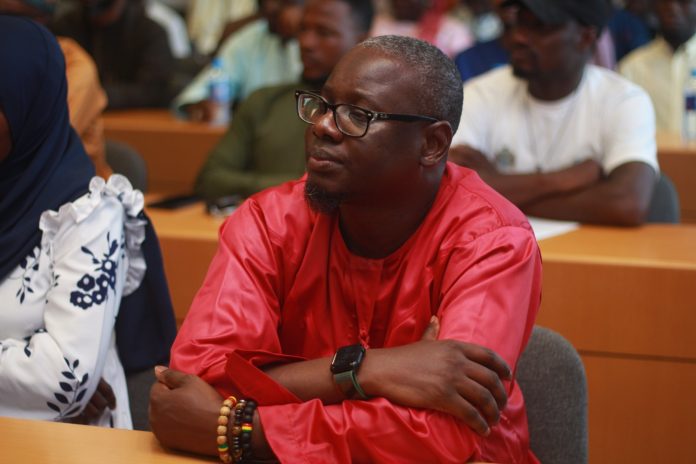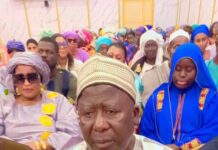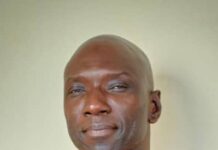By: Imran Darboe
“Some moments are nice, some are nicer, some are even worth writing about.” – Charles Bukowski
Attending Dr. Saja Taal Inaugural Law Lecture was more fun experience than I anticipated. At some point, looking around the lecture hall, I felt the excitement of an adolescent attending a rap star concert — only this time, the stage was the realm of intellectual discourse headlined by double PhD holder, Dr. Satang Nabaneh. Having read some of her work, I knew the lecture would be an intellectual treat, but seeing her in person was an even more interesting experience. This piece will reflect not only about the lecture, but the lecturer too, both were great.
On my way to the lecture hall, I passed Dr. Nabaneh at the entrance of the hall, posing for photos alongside the program banner in the same way you would expect a first-year university student to. That was my first surprise – given that intellect, I almost expected a giant, but surprise! She was shorter than I imagined. As she entered the hall she immediately engaged in a flurry of greetings and conversations, that again contrasted with the aloofness I imagined from such a distinguished scholar. Soon enough, she was introduced and stood before the audience to deliver her lecture.
She began with the same enthusiasm that I saw earlier, and as she took us through her lecture, I was really captivated by the joyful, animated mode of delivery, almost as if she could hardly contain the intellectual brilliance within. I imagined her mind working like a fusion reactor, yet from the introductions and her own anecdotes, it dawned on me, “she is young! This and everything I’ve said above is significant because we were sitting in a roomful of intellectuals, many of whom are veterans in their fields of expertise, yet here we were, captivated by the knowledge coming from a young Gambian woman. I realized the transcendence of intellectual knowledge, how ageless it was. It would be hard to imagine any other medium that could bring this variety of age differences to sit together and listen, to someone decades younger than many. Even music and other forms of art are limited by the fact that different age demographics incline to different genres. Therefore, knowledge, in whatever form, should be the thread we weave around ourselves to bring each other closer and find a common direction.
But it was also the fact that the energy that flowed from the speaker, the joy with which she shared her ideas and advocated for her vision for The Gambia, were borne from her youthfulness. It allowed her to carry the vast knowledge with flair and ease. She was not only spewing theoretical rhetoric but was practical, was in touch with the people (earlier observations) and looked ready to act on the ideas she was sharing if there ever was the opportunity — or in fact, to create the opportunity if it wasn’t made feasible by the status quo. My perception is indeed backed by Njundu Drammeh’s description of her, identifying as a scholar-activist. Dr Nabaneh made me realize, with pleasure, that finding the formula to take Gambia forward, the ability to lead and inspire, resides in the young as much as in some of the elders. Thus, young people do have to have a seat at the table and can even sit at the head of the table, if supported by great and experienced minds in synergy, towards a common goal.
This also led me to realize the fact that, for this young woman to have achieved what she achieved, (including the double PhD), does not happen in a vacuum. Her enthusiasm and passion for knowledge, her activism for positive change, her confidence, do not come by accident or chance. Considering that she was under the eye of folks like Njundu Drammeh since she was 10 years old and she was surrounded by peers like Sait Matty Jaw; that her experiences took her through institutions like Lend-a-Hand Society and the Girls Guide, tells a lot. People are shaped by institutions, both social and academic, among others. I realized that people like Satang and Sait (and even myself) are products of strong institutions that created the right mould in terms of mindset, values, and character. Thus, I think we owe it to the next generation to rebuild the mould, to reset those standards set by the earlier generation of Gambians — folks like Dr. Saja Taal, Raymond Gibba, Njundu, Madi Jobarteh, Dr. Abdoulaye Saine, and so many others. How could Dr. Nabaneh not be brilliant if she grew up taking inspiration from such minds? If her intellectual sounding boards are Madi Jobarteh and others like him?
Dr. Nabaneh is on course to carry that goodwill forward, and her lecture offered something of a blueprint or roadmap towards a truly republican Gambia. The content of her lecture really felt like a direct conversation to me, especially since I had just finished a presentation on assessing Gambia’s transitional justice reforms earlier in the day. The lecture focused on ten key points she believes are critical to forging a republican future for The Gambia. Most significant for me, however, was the iteration that the ten points cannot and should not be considered in silo. Thus, when she proceeded to discuss the ten points, one resonated most with me —repurposing education in The Gambia.
Education is the foundation of progress. Restructuring what we teach our future generations and how we teach it, is critical for developing the human capital we need for future development. But it goes beyond that — it’s about embedding values within the educational framework that create honest and innovative feature leaders. Dr Nabaneh convincingly argued that reform must be envisaged in the context of decolonizing the mind, harnessing contemporary technological advancement and connecting education to national priorities. This point resonates with another of her ten points—the need for ethical and inclusive leadership. Effective education reform is unimaginable in the absence of leadership that recognizes the need to inculcate values and understands the necessity of moving away from replicating colonial modes of governing. Similar to education, the points she made on agriculture (utilizing our potential to improve the sector), and the need for a robust and efficient health sector, among others, all hinge on the point about leadership. Additionally significant is her other cross-cutting point on the inclusion of women in pursuit of each of the 10 point presented. She argued for recognizing and mainstreaming of women, beyond tokenism, but genuine commitment. Women’s inclusion is as essential as a blood transfusion for an anemic, for a society that desperately needs to leverage the capacity and passion of women giants in our midst. Addressing barriers to women’s full participation in nation-building requires not only awareness but also structural and attitudinal changes that can only happen with full commitment from all sectors of society. It is not just a matter of fairness but of necessity.
In sum, Dr. Nabaneh and her lecture will, I’m sure, motivate and inspire, especially the young. It offers hope for the future, and instils pride in the legacy of the older generation of intellectuals who contributed to the foundations and institutions that created the likes of her.
As I reflect on her lecture, I am filled with a sense of possibility. The ten points she outlined are not just theoretical concepts but actionable steps that can guide us towards a more just and equitable society. But to realize this vision, we need to work collectively. We need to create the infrastructure and framework, that will support the emergence of more brilliant minds like Dr. Nabaneh’s. Investing in education, promoting ethical leadership, and ensuring genuine inclusion in all sectors are critical. We must break down the barriers that hinder progress and participation of women and foster an environment where knowledge and innovation can flourish. By doing so, we can unearth the hidden gems within our society and bring them to the forefront, just as Dr. Nabaneh’s shone yesterday evening.
This inaugural law lecture was a powerful reminder of the transformative potential of knowledge to inspire and serve as a stepping stone. Dr Nabaneh’s insights and enthusiasm left an inspiring impression on me, enhanced by comments from other speakers too. Madi Jobarteh asked something that I have also wondered about for quite a while now, “When were we ever a republic in the real sense of the word?” And I guess whether or not we have ever been, we are at a crossroads where we must choose the path that will lead us there. That requires us to think (critically) about the future. As we move forward, let us take Dr. Nabaneh’s ten points to heart, working together to devise the means to realize each one so that every Gambian will have the opportunity to shine, just as she has shown we can.






